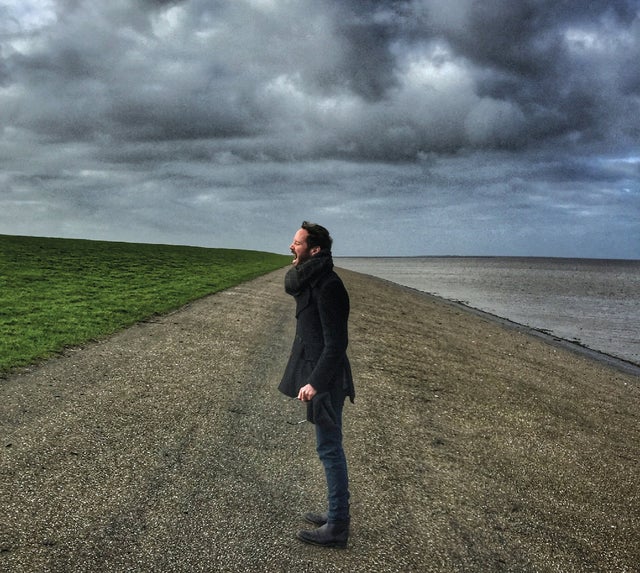- Dean Roberts
- >
- Dean Roberts - Not Fire (CD)
Dean Roberts - Not Fire (CD)
SKU:
$14.00
$14.00
Unavailable
per item
CD
ErstPop 003
Berlin-based songwriter Dean Roberts' first album in 12 years is a collection of dark and melancholic songs, set in unusual formats based around guitar, electronics, strings, with subtle rhythmic elements, performed by Dean's Dark Moth Ensemble, with additional musicians that include Boris Hauf on piano and The Neck's keyboardist Chris Abrahams on harp.
For lossless (16/44) files, go to this page.
|
TRACK LIST
1. Say After Me 06:18 2. Caroline 03:07 3. My Diviner 07:59 4. Kids 02:42 5. Heron 09:50 6. Paul 03:43 7. Untrained Spirit 01:39 8. Dead Insects 03:17 9. Not Fire 08:48 (released March 5, 2020) CREDITS
Dean M Roberts - Vocals, Guitar, Piano, Bass, Percussion, Lap-steel The Black Moths: Emanuele Porcinai - Feedback Guitars, Backing Vocals Chris Abrahams - Harpsichord Jenny Lange - Piano, Backing Vocals Leighton Craig - Reeds Sandra Selig - Vocals and Effects Valerio Tricoli - Organ Lucky Paul Taylor - Drums Andrea Belfi - Drums Additional: Erin Lang - Bass, Vocals Boris Hauf - Piano Andi Stecher - Percussion/Drums Ekkehard Ehlers - Advisor Tim Barnes - Advisor recorded and produced by Dean Roberts, Emanuele Porcinai and Giuseppe Ielasi recorded at The Pines Studio, Berlin, 2019, except 5 and 6 recorded at White Winged Moth, Aotearoa, New Zealand, 2014. mixed/mastered by Giuseppe Ielasi at Senufo, Milan, December 2019-January 2020. photography - Erin Lang design - Yuko Zama executive producer - Jon Abbey He nui te mihi me te mihi - much gratitude and thanks to Bic Runga and to Chris Eckman and Carla Carla Torgerson Much gratitude to David Bryant for studio and instruments and Julia Reidy and Heike Marie Rädeker for guitar support |
REVIEWS
Marc Medwin, Dusted In its earliest days, the now 20-year-old Erstwhile label focused on improvised music. In collaboration with Werner Dafeldecker, Dean Roberts released the heady and ear-trippy Aluminium in 2001. Now, on the ErstPop sublabel, he returns with his first solo disc in more than a decade, and beyond being well worth the wait, it prods the acoustical and spatial boundaries in ways that his devotees will recognize while offering some beautifully evocative songcraft. There’s something raw and graceful about the album, something nearly woolly but intimate, as if the disc can’t decide in which environment it resides. The opening moments of the title track inhabit a space somewhere beyond my headphones. It’s just before the entrance of Roberts’ voice, that voice uncertain if it’s sleepy or on the edge of some ragged emotion, that the whole space changes. As he prepares to sing, we get a close-up of his mouth, center stage and full-on, an ASMR blast of tongue and teeth close enough for discomfort. This is not a new experience for Erstwhile listeners who need only go back to Matthew Revert and Vanessa Rosseto’s Everyone Needs a Plan for such stunning intimacy, but here, the text adds a layer of mystery that isn’t really mystery at its heart. “You spin me around until nothing hurts, you gave me a glass and then spilt it,” Roberts accuses, or simply intones; through it all, each consonant, each rasped and hissed breath, belies the maelstrom beneath, or is it transcended? In this, he conjures memories of early Elvis Presley and more recent David Sylvian, though it should go without saying that Roberts is certainly closer in spirit to the latter. On a whole other emotional plain is “Caroline,” a study in desire for a different sort of intimacy and a complex look at freedom. “Let’s go out and get whiskey baby, let’s go out and get oxygen, let’s find out who’s escaping who by pacing across the room.” He’s not fooled by the subtleties of his vision as his double-tracked vocals plod and slide forward: “Faint little lies become truths.” Look no further than “Kids” to hear the anger burst forth in seething instants, promptly pulled back, or to grasp the regretful non-resolution of the final heartbreaking question: “Would it have changed anything if we had kids?” The instruments live in a similarly cluttered half-world, full of confrontation but with much in the shadows. The album sports a huge cast of characters, including Chris Abrahams among the several keyboard players, whose distant harpsichord halos strategic moments of the title track. It’s extremely difficult to tell who’s playing at any given moment, so inconstant are the soundscapes as they swim in and out of focus in a Protean mix. It’s really more accurate to say that density is always giving rise to unexpected clarity. As “Kids” breaks down, the disorder is made plain as “pop” or “post-punk” viscera exits for the crystalline cold of meterless electronics. Moments slam themselves against whatever wall of sound is being carefully erected. The scraping of something down the fretboard at 5:44 of Roberts’ gorgeous cover of Bic Runga’s “Say After Me” is terrifying in a landscape ill-prepared for its intrusion, but the sound transgresses its own boundaries, calling attention to the process of its creation. In one ear, we hear the scrape itself, while the distorted result, clear across the stereo spectrum, threatens to annihilate everything in its path. The delayed and filtered guitar and keyboards on “Dead Insects” speak to the subtler aspects and to the time invested into the wild mix. On the Godley and Creme album Consequences, Peter Cooke says, “It’s taken me years to achieve this mess,” which might be applied to Roberts’ brand of studied chaos. It’s beautiful, it’s harrowing and it’s raw but somehow squeaky clean while avoiding sterility. The constantly morphing music and often dislocated lyrics are of a piece, and they work together to create an experience to be perceived from many angles, each evoking a present negotiating its place among complicated pasts and future uncertainties, finding, as Roberts intones, where it fits “in the grand scheme of things.” Joshua Minsoo Kim, Pitchfork Not Fire is the first album from Berlin-based songwriter Dean Roberts in 12 years, and his comeback arrives during apocalyptic times. It's not an album about someone who's found hope or love despite everything; Roberts sounds exhausted, and his album is as ugly and as bleak as life often is. For those who've been in the pits and succumbed to self-destructive nihilism, Not Fire is a reminder of how hellish it all can be. Sonically, Not Fire is murky and battered and melancholy. Guitars clang incessantly, drums lurch without vigor-there's hardly a moment where one doesn't feel placed in a barren wasteland, left to wander aimlessly. On "Say After Me," a melange of noisy guitar strums and plucks constantly ring out without any impression of oncoming closure. In the song's final passage, Roberts slides his pick down a guitar string, the resulting sound a thunderous roar, the final bellowing of bottled-up feelings. Not Fire can sound a lot like a pained desire for release, a wish to scream into the emptiness like Roberts does on the album cover. Nothing here feels cathartic, however. If anything, every note just propagates uneasiness, something that's fiercely evident on the nearly 10-minute centerpiece "Heron." Reed instruments and wolf-like howls imbue the piece with anxious tension. Frightening as the music may sound, Roberts sings of acceptance ("There is no blistering sun 'cause the summer's just gone"). The song's final third is wordless, but you can still sense his mournful presence. Even when the songs aren't harrowing, Roberts' weariness and irascibility are clear. On the bluesy folk song "Paul," he speaks of the titular person as a thorn in his side-a burdensome figure who's always there at the worst of times. He concludes with a confession: "I always run into you Paul/And say I'll call/But I don't want to." This longing for solitude becomes an unwelcome reality on "Kids," where he talks about the crumbling of a long-term relationship. "Would it have changed anything if we'd had kids?" he wonders. You can tell, from his wavering voice, that he doesn't think so. Throughout Not Fire, Roberts feels numb. A summation of his downward spiral appears on the title track. "It's not fire; love is something else" he moans. His voice quivers amidst droning feedback and heaving drums, the song exuding the shut-in mystique of Jandek's early works. As the song builds, Roberts never finds healing; he only sounds tormented, broken. There is one hopeful song on Not Fire. With "My Diviner," Roberts delivers anguished expressions of gratitude. The mythical figure of the title leads him to water in a period of drought, and proves to be a steady light in his life ("You're not one to quit, that ain't how you live"). The sweetness is a salve from the misery that looms over everything else. In a time when gods feel ever-absent, when futures seem increasingly dim, "My Diviner" serves as a thoughtful reminder: life's shittiness is promised, but so is the nourishing comfort that comes when receiving persistent care. It sounds like a call to hold fast and love hard. |



